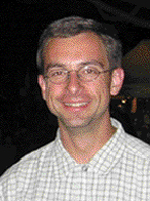Bio: Henrik Wann Jensen joined the UCSD faculty in July 2002 following three years as a research associate at Stanford University. Before Stanford, he was a post-doctoral researcher in the graphics group at MIT, and between 1996-98 a research scientist in industry working on visual effects software. He received his Ph.D. in Computer Science from the Technical University of Denmark in 1996.
Research: One of Professor Jensen's major contributions is the photon mapping algorithm for simulating global illumination in complex, three-dimensional scenes such as those used in architecture, design, and visual effects for film. His photon mapping technique extends ray tracing and makes it possible to simulate effects such as caustics (focused light, such as shimmering waves at the bottom of a swimming pool), diffuse inter-reflection (e.g., the bleeding of colored light from a red wall onto a white floor, giving the floor a reddish tint), and participating media (e.g., clouds, smoke, and fire). The photon mapping method is very practical and it has been widely adopted in industry, since it makes it possible to render images of virtual scenes that are indistinguishable from photographs.
Jensen also developed the first methods capable of rendering translucent materials such as snow, marble, milk, and human skin. His approach is based on a mathematical model that describes how light scatters inside translucent materials. Even though this research is very recent it is already being used extensively in the movie industry, and it is expected to result in the first truely photorealistic digital human. Jensen has described his photon mapping method for rendering images in his book 'Realistic Image Synthesis Using Photon Mapping,' published by AK Peters in July 2001, and in a Japanese translatation by Omsha Ltd. in July 2002. He has lectured on the subject to computer graphics artists at major digital-effects companies including Disney, Pixar, and Industrial Light & Magic. His work has been widely profiled in international media.
|

